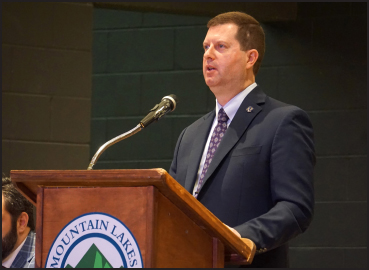Mountain Lakes Chamber hosts event with local school leaders
Story and Photos by Emily Kirby
[email protected]
The State of Education address was held Wednesday, February 28, 2024 at the City of Scottsboro Civic Center at Goosepond. The event, hosted by the Mountain Lakes Chamber of Commerce, included presentations from the Public Affairs Research Council of Alabama, Scottsboro and Jackson County Boards of Education and an update from Northeast Alabama Community College (NACC) on the statuses of each school system.
Public Affairs Research Council of Alabama (PARCA)
PARCA Executive Director Ryan Hankins, Pd. D, spoke to the combined advances, diversities, and areas for improvement throughout the Mountain Lakes region.
PARCA is a nonprofit organization whose work helps “inform and improve state and local government in Alabama through independent, objective, non-partisan research,” according to parcalabama.org.
Hankins’ presentation looked at both the Scottsboro and Jackson County school systems combined to depict a more realistic view of the status of education in the Mountain Lakes Region. The area has seen a steady 18% reduction in enrollment since 2000, possibly due in part to an aging population and decline in birth rate. Current enrollment in the Jackson County School system sits at 5,038 and Scottsboro at 2,435.
Results from the Alabama Comprehensive Assessment Program showed growth in Math, English Language and Science. Both school systems combined as the Mountain Lakes region average 44% proficiency (sixth out of 13 combined school systems) in all subjects and grades, compared to the state’s average of 38%.
Rankin said the 2019 Literacy Act, which requires third grade students to read on grade level by the end of third grade, showed a decline statewide, leaving nearly one in four students not proficient. Adversely, the percentage improved for the Mountain Lakes region, with 14%, or approximately 45, students not reading at grade level in 2023.
Students who are “college-ready” totals approximately 10.5% in all four subjects, meaning they are on track to earn a “B” or better. Graduation rates have dropped from 93% in 2018 to 89% in 2022, but career-readiness has improved.
Scottsboro City Schools
Scottsboro City School Superintendent Amy Childress said they strive to inspire, challenge, and empower every student, everyday, with the system’s four-part foundation.
Academic Achievement
Scottsboro scored an 87 on the 2022-23 state report card, with a 90 at Nelson Elementary, 91 at Caldwell Elementary, 87 at Collins Intermediate, 82 at Scottsboro Junior High, and a 79 at the high school.
“We have many variables that didn’t exist pre-COVID that do now, and so, moving forward, we are very pleased with our results,” said Childress. “We are very proud of where we are. I think the data is a true testament to what educators are doing right now. Working through learning loss during COVID has really challenged every educator, and I think that we’ve had to work much harder to maintain right now.”
Juniors were administered the ACT with promising results, 89% of students scored above the state average in AP Literature and 100% scored three or above in AP Calculus.
Foundational Wellness
The Foundation Wellness focus includes safety, behavioral supports, individual student supports, including a Peer Monitoring Program, CEP Meal Options, Nourish One Backpacks, and a district-wide poverty simulation. A challenge in this focus includes funding for nonacademic programming.
Workforce
Development
“By expanding access to career tech programs and enhancing their quality, we can empower our youth with vital alternatives to traditional academic pathways and equipment with the skills they need to thrive in a 21st century economy,” said Childress.
Programs for workforce development include a Redstone Student Branch, CTE Career Fair, Simulated Work Environments, collaboration with NACC and the Kevin Dukes Career & Innovation Academy, and the Hard Hat Girls and Women Program.
Engaged Stakeholders
“It takes a village. We couldn’t do this without all of the partnerships that we have,” said Childress. “[The stakeholders] contribute to the continued successes we see in our academics, we see in our fine arts, and we see in athletic programs. It matters and we see that.”
Jackson County Board of Education
Jackson County Superintendent Jason Davidson said with the vast area the school system covers, combined with high rates of poverty in the county, the administration hopes they can equip students with a meal and knowledge to help them in their situations.
Davidson said the district has:
- three mental health workers for all 17 campuses
- four resource officers
- five after-school 21st Century Learning
- Pre-K in every elementary school
- Indian Education Services
Davidson said the district’s advancements and existing programs are funded on the federal, state, and local levels.
With pandemic-era funding quickly coming to an end, the school system is going to be looking for other support to fill the void from the federal funds that will go away.
“If we can’t partner with our local communities, businesses, and other entities, then we’re not going to be able to continue with the fast progression we’ve had over the past two or three years.”
Report Card
Jackson County scored an 88 on the State Report Card, with three “A” schools (Dutton, Skyline, and North Sand Mountain.) Woodville was one of the highest improved schools in the state, and Jackson County earned #9 out of all 67 county districts in Alabama.
Career Tech Education
The county now holds 14 total Career Tech Education programs, with 17 instructors, and 1,860 students enrolled in courses.
“We made the goal to focus on career tech education. That was Mr. [Kevin] Duke’s mission. That was the board’s mission. The resources put behind the Kevin Dukes Career & Innovation Academy was to secure kids with opportunities for career tech education. That has paid dividends,” said Davidson.
The county has great participation rates, completion rates, and partnerships when it comes to CTE and industries are continually recruiting workers from the innovation center, he said.
The school system’s current strengths include:
- Marzano Level 1 Certification status
- Fine Arts, STEM, Cyber and Culinary programs
- 4.27 months of reserve financially
- Increase in enrollment
- Bus fleet upgrades
- Schools with multiple sports programs in the playoffs
The school system’s current challenges include:
- Recruiting teachers
- Aging facilities
- grants/funding
- Mental health workers and School Resource Officers
- Poverty
- Geographic challenges/feeder patterns
Northeast Alabama Community College
“There’s so many great connections between Northeast and Scottsboro High School and Jackson County Schools,” Dr. David Campbell, president of NACC, said. “We all work together and look for ways that we can accomplish things and provide new opportunities to students from the area.”
Campbell said the important aspects of a community college include the retention, completion, transfer rates, and job placement.
“You don’t just enroll people and leave it at that. Every step in that process is important,” he said.
Enrollment numbers are up 18% at NACC this spring, the highest since 2014, with 2,905 students. Dual enrollment numbers are also higher this year with 28 schools in the service area participating. NACC holds the highest retention rate of the 24 community colleges in the state, and is in the top three for completion.
For the future at NACC, Campbell said the community can look forward to expansions in Healthcare programs, including dental hygiene this fall and a lab technician and diagnostic imaging program. The new workforce training facility is “coming along well.” It is a 55,000 square foot training facility that will hold most of the existing career tech programs, in addition to new programs.
NACC’s addition of a softball team is fast approaching as the stadium is set to be complete this September. The school has already signed 24 players, and they are looking to add a soccer program next.
Campbell said the college’s many cultural programs aim to “expand horizons” for students and the local community that might not have the opportunity to experience in our area. A popular annual event in June is the Latino Festival, which honors the 17% Hispanic population at NACC.
Other events include:
- The Sand Mountain Soiree held in the spring.
- NACC Gala each fall.
- Writers’ Symposium.
- Singer’s Songwriters Showcase each summer.
- Alabama Ballet performances.
- The well-received NACC Theatre.



